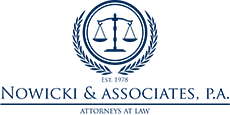
Personal Injury
Premises Liability
Premises Liability often refers to an accident that occurs on another person’s property, which means that property owner may be responsible for slip and fall injuries, or other injuries sustained while you are on their property. If you have been hurt while on someone else’s property, it may be difficult to prove who is responsible for your injuries.
What are Slip and Fall Accidents?
Slip and fall accidents, as the name implies, occur when a person trips or slips and falls and becomes hurt.
Many hazardous conditions lead to these types of accidents:
-Tripping on torn or wet flooring
-Falling in places that have dim lighting
-Tripping and falling down narrow steps
-Falling over uneven sidewalks or other outdoor hazards
When trying to successfully prove responsibility for a slip and fall, it is essential to show two factors:
The accident was caused by a dangerous condition.
-The accident was caused by a dangerous condition.
-The property owner knew or should have known the risks of allowing that condition.
If your slip and fall accident meets those two factors, you may be able to recover expenses such as medical bills, lost wages, and pain and suffering. To file a successful slip and fall lawsuit, you need assistance from an experienced Maryland slip and fall attorney.
Common Injuries Sustained from Slip and Fall Accidents include:
Broken Bones, Soft Tissue Injuries, Spinal Cord Injuries, Cranial Injuries, Cuts and Bruises
Types of Damages You Can Recover after a Slip & Fall Accident:
If you were injured in a slip and fall accident, you may be able to recover damages. In personal injury cases, you may recover three different types of damages.
Economic damages reimburse you for the financial costs of your accident. A defendant (or their insurance company) pays you for medical bills and lost wages.
Non-economic damages attempt to pay you for your emotional damages suffered as a result of your slip and fall injuries. This category includes things like pain and suffering. For example, if you can’t enjoy relationships like you used to, a court may award payment for loss of companionship (known as loss of consortium).
Sometimes a defendant commits a particularly terrible form of negligence or a deceptive action. For instance, a defendant may destroy video surveillance of a slip and fall. In such a case, a court may award punitive damages. However, courts are not likely to award punitive damages in typical slip and fall cases.
It’s important to gather any available evidence that proves the defendant was at fault for your slip and fall accident. After your accident, take these steps to gather evidence for your case.
If possible take pictures of the scene as it was when you fell. Do this right away or send someone to the scene as soon as possible. Later, when you have recovered and calmed your nerves write down the events that led to your fall, what happened when you fell, and what happened after your fall. Include exact times, locations, people around, people’s reactions and statements, if possible.
In your written summary of your slip and fall experience, describe environmental factors. Was the ground slippery? Was a tile loose or a bulb burned out? Write down everything you remember.
Take photos of the accident scene as soon as possible. This documents the scene before the property owner repairs (and covers up) the issue that caused your slip and fall.
Get names and contact information from all witnesses to your accident and employees of the property on duty at the time.
Report your slip and fall to the property owner or store manager. If it is a commercial establishment, request a copy of any incident report.
Seek medical attention for any injuries. If you need medical treatment before completing the previous steps, appoint a friend or family member to complete those steps. Keep all medical records that describe the extent of your injuries and the expense of receiving treatment.
Store your shoes and clothing worn in the accident. The defendant might assert that your clothing caused your trip or slip. Your attorney can show that it didn’t.
If you document your accident carefully, you have a better chance of attaining a settlement.
If you are interested in learning how Nowicki & Associates can help you, contact our office to arrange a consultation. Call us at 410-879-0026 or email Tyler J. Nowicki, Esq. directly at Tnowicki@jwnlaw.com. All consultations are free and we’ll take the time to answer each and every question.

